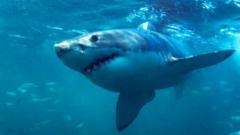A recent study reveals that outfitting surfboards with LED lights could help deter great white sharks, which are responsible for the majority of shark-related fatalities.
Innovative LED Surfboard Design Aims to Reduce Shark Attack Risks

Innovative LED Surfboard Design Aims to Reduce Shark Attack Risks
Australian researchers propose a novel, non-invasive solution to prevent shark attacks by integrating LED lights into surfboards.
The findings suggest that altering the silhouette of surfers may provide a new avenue for enhancing safety in ocean sports.
Researchers in Australia have discovered a potentially game-changing method for reducing shark attacks by equipping surfboards with LED lights. Conducted in Mossel Bay, South Africa, the study involved towing seal-shaped boards with varying light configurations to assess the sharks' reactions. The researchers at Macquarie University revealed that the lights could distort the silhouette of their "decoys" on the ocean's surface, making it more difficult for great white sharks to spot them against the sunlit backdrop.
Lead author Laura Ryan emphasized the significance of these findings, noting that great white sharks often mistake surfers for their natural prey, particularly seals. With 69 unprovoked shark bites reported in 2023 globally, 10 of which were fatal, researchers are exploring this innovative method as a safer alternative to traditional deterrents like nets or drones.
The study, published in the journal Current Biology, tested three different intensities of LED lights, discovering that the brightest horizontally-aligned lights had a lesser attraction to sharks. The team reiterated, "Our results reveal the importance of a dark silhouette against a lighter background in predatory behavior in great white sharks." They believe that modifying the silhouette could be central to the development of new shark deterrent technologies aimed at protecting human life.
Given the mixed responses of various shark species to bright objects, researchers are keen to understand the broader implications of their findings for species like bull sharks and tiger sharks, known for attacks on humans.
In response to the promising results, the researchers are now in the process of designing prototype lighting strips specifically tailored for surfboards and kayaks.
Researchers in Australia have discovered a potentially game-changing method for reducing shark attacks by equipping surfboards with LED lights. Conducted in Mossel Bay, South Africa, the study involved towing seal-shaped boards with varying light configurations to assess the sharks' reactions. The researchers at Macquarie University revealed that the lights could distort the silhouette of their "decoys" on the ocean's surface, making it more difficult for great white sharks to spot them against the sunlit backdrop.
Lead author Laura Ryan emphasized the significance of these findings, noting that great white sharks often mistake surfers for their natural prey, particularly seals. With 69 unprovoked shark bites reported in 2023 globally, 10 of which were fatal, researchers are exploring this innovative method as a safer alternative to traditional deterrents like nets or drones.
The study, published in the journal Current Biology, tested three different intensities of LED lights, discovering that the brightest horizontally-aligned lights had a lesser attraction to sharks. The team reiterated, "Our results reveal the importance of a dark silhouette against a lighter background in predatory behavior in great white sharks." They believe that modifying the silhouette could be central to the development of new shark deterrent technologies aimed at protecting human life.
Given the mixed responses of various shark species to bright objects, researchers are keen to understand the broader implications of their findings for species like bull sharks and tiger sharks, known for attacks on humans.
In response to the promising results, the researchers are now in the process of designing prototype lighting strips specifically tailored for surfboards and kayaks.


















